Groundbreaking Workshop on AI and Technology-Facilitated Gender-Based Violence at AWiM24
Trending
Saturday May 31, 2025
Trending
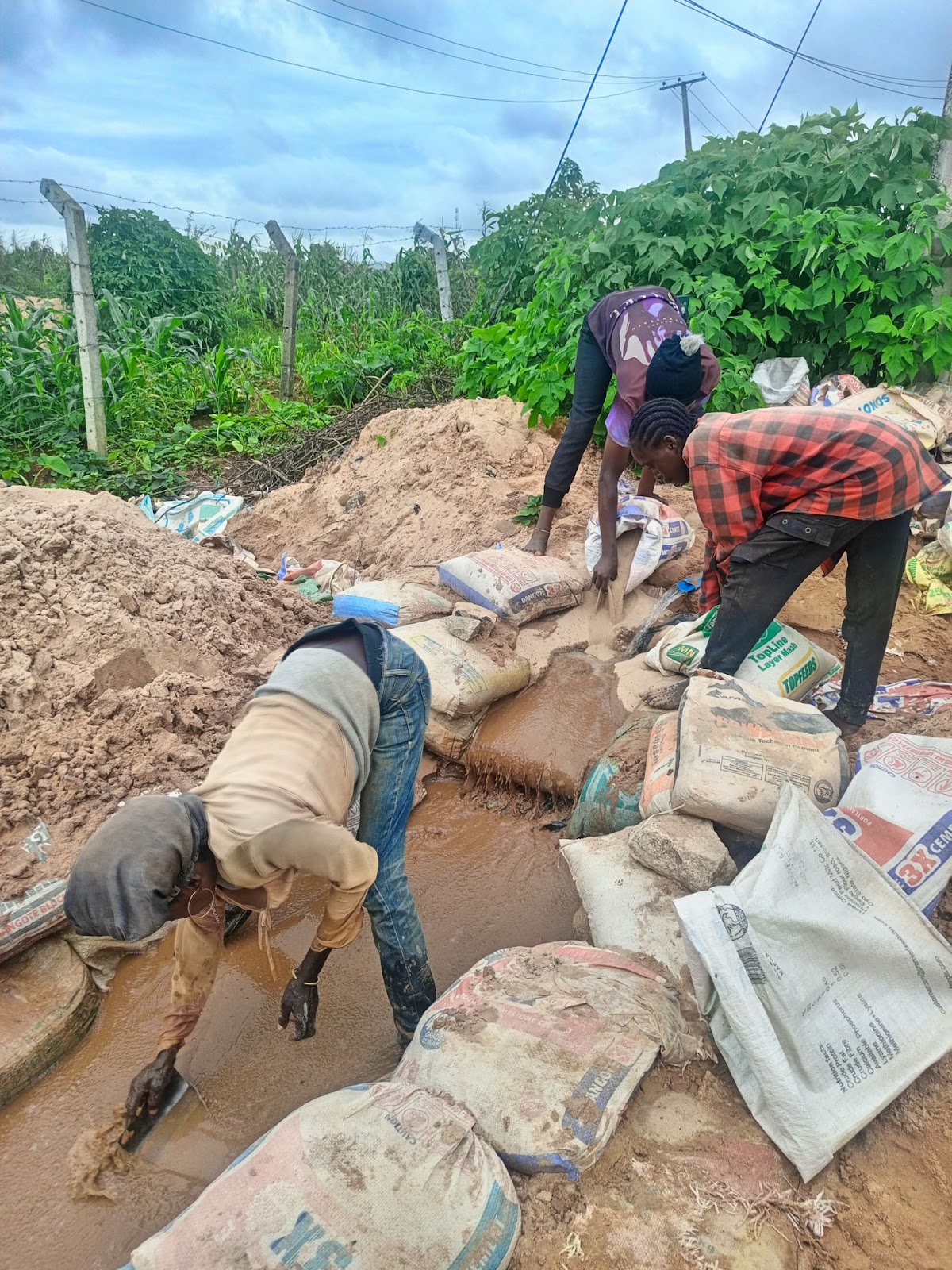
Mineral washing site at JIB Quarters, Jos. Photo Credit: Marie-Therese Nanlong
Placing her plastic bowl on her head, a bag on her shoulder, and her baby strapped on her back, 40-year-old Esther Gyang, hurries to join a group of other women heading to the mining sites at the Kwang community, Jos South local government area of Plateau State, north central Nigeria
She cheerfully waves at passersby, obviously some acquaintances, as they hail her in the Hausa language, “sarauniya kuza,” meaning the Queen of tin mining
Esther, who does not have a formal education, does menial jobs at the tin mining sites, she moves from her Zot Yuus community in the Jos South local government area to the different mining sites in the local government area and beyond. “My first time at the mining sites was in 2018. I have worked in the mining sites in the bushes of Jos, Barkin Ladi, and Riyom but stopped because of insecurity threatening miners and farmers’, she said.
Mining as an occupation is highly dominated by men and for a woman to survive in this sector, she must try twice as hard as the men on the field.
Audiogram of AWiM’s interview with a Female Miner in Jos
According to Esther, since women do not have mining pits, a female miner needs to attach herself to a team working for the men. She said some of the men will go the extra length of frustrating a woman they intend to sleep with, just to make her comply. ‘’Many women have had to leave the trade due to harassment and many have had to endure it so they could feed their children’, she said
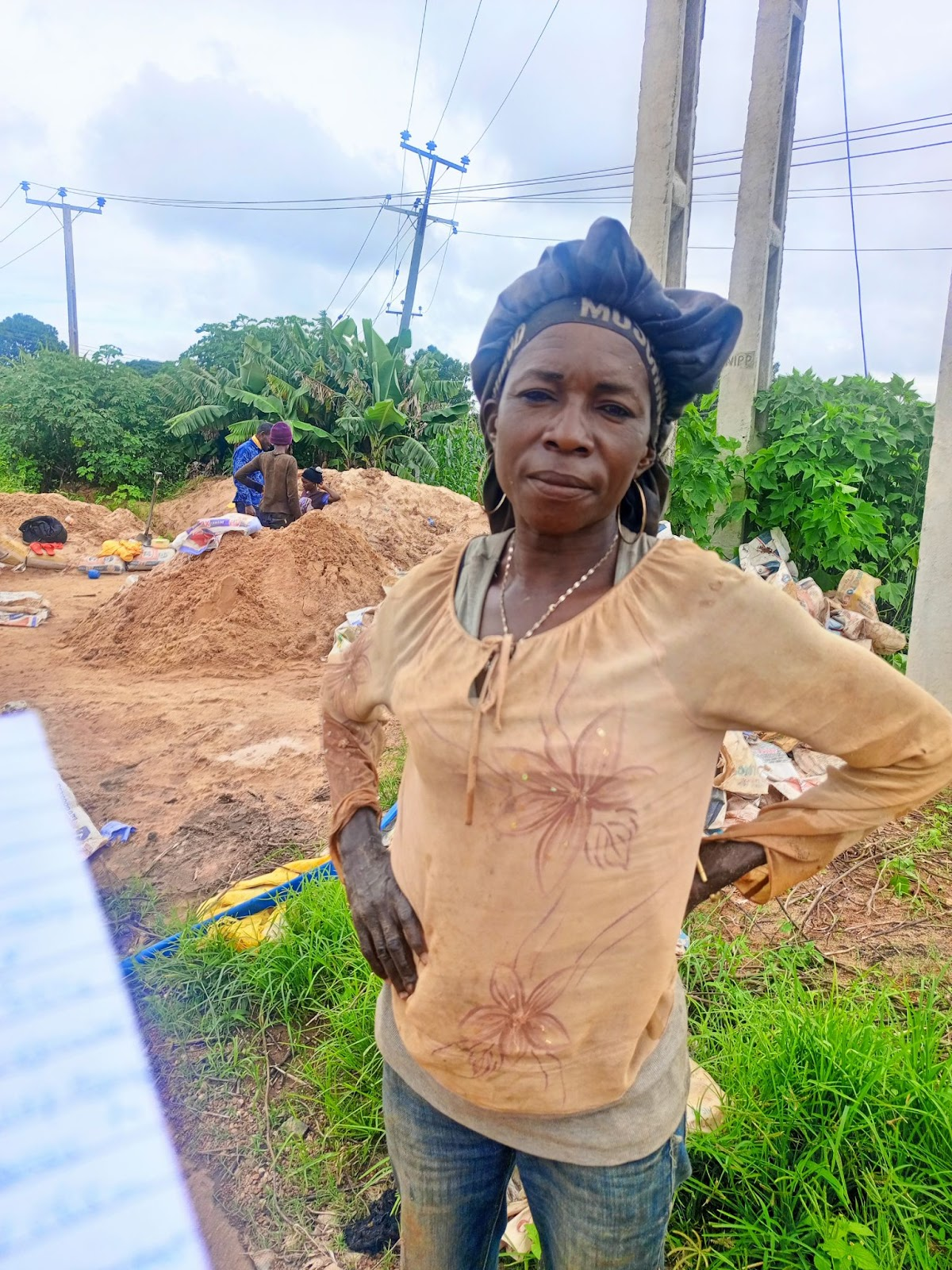
Mrs. Jummai Daniel. Photo Credit: Marie-Therese Nanlong
Mrs. Jummai Daniel has spent 28 years in mining and has experience working on sites, washing out minerals, and at tin sheds. came into mining 28 years ago when things were too hard for me and there was no help even from my husband. I worked in the rain and the sun. My husband is alive, but I am a single mother because of no assistance. There is sexual exploitation, especially in the mining fields, men will want to sleep with you before they will allow you to benefit from what is being obtained from the mining pit
Sexual exploitation is like trade and barter, but the women will only get a plate of food and what is called “kwangila “which means the last heap of sand before the tin deposits. These have very little quantity of tin compared to the main deposits). If you allow it, every man that you want to work with will demand sex from you,” she stated.
For Deborah Lucky, who has been around the mining fields since childhood, sexual harassment is real and done very openly. The situation is worse where the mining pits are dug. Once some men get portions of land to mine, they sometimes use these as bait to accost some women. “The women agree to date the men so that they will be given some of the tin. The randy men can touch a woman roughly.” She explained
FEMALE MINNERS AND ALLEGATIONS OF SEXUAL HARRASMENT
Sexual harassment at the workplace is all-encompassing. It could be seen as unprofessional behavior that entails unwelcome sexual advances and other unwholesome acts which negatively impacts on work and attitude to work as well as undermines gender equality, and the dignity of workers.
The International Labour Organization, ILO defines sexual harassment as a sex-based behavior that is unwelcome and offensive to its recipient. ILO’s work on violence and harassment against women is guided by the 1998 Declaration on Fundamental Rights and Principles at Work; the Discrimination Convention (No. 111) and Recommendation (No. 111), 1958; the Forced Labour Convention, 1930 (No. 29) and other provisions entailed in the declaration
African Union Policy on prevention and response to sexual exploitation on the other hand, sees sexual exploitation as the inducement, incitement, coercion and compelling of another person to undertake a sexual activity through abuse of a position of vulnerability, differential power, dependency or trust.
The document lists sexual exploitation to include, but is not limited to, exploiting material, monetary, social, psychological and political advantages to induce a person to engage in a sexual activity. It stresses an act of sexual exploitation occurs when the person would have had no substantial option, and no reasonable choice but to succumb to pressure to engage in a sexual activity.
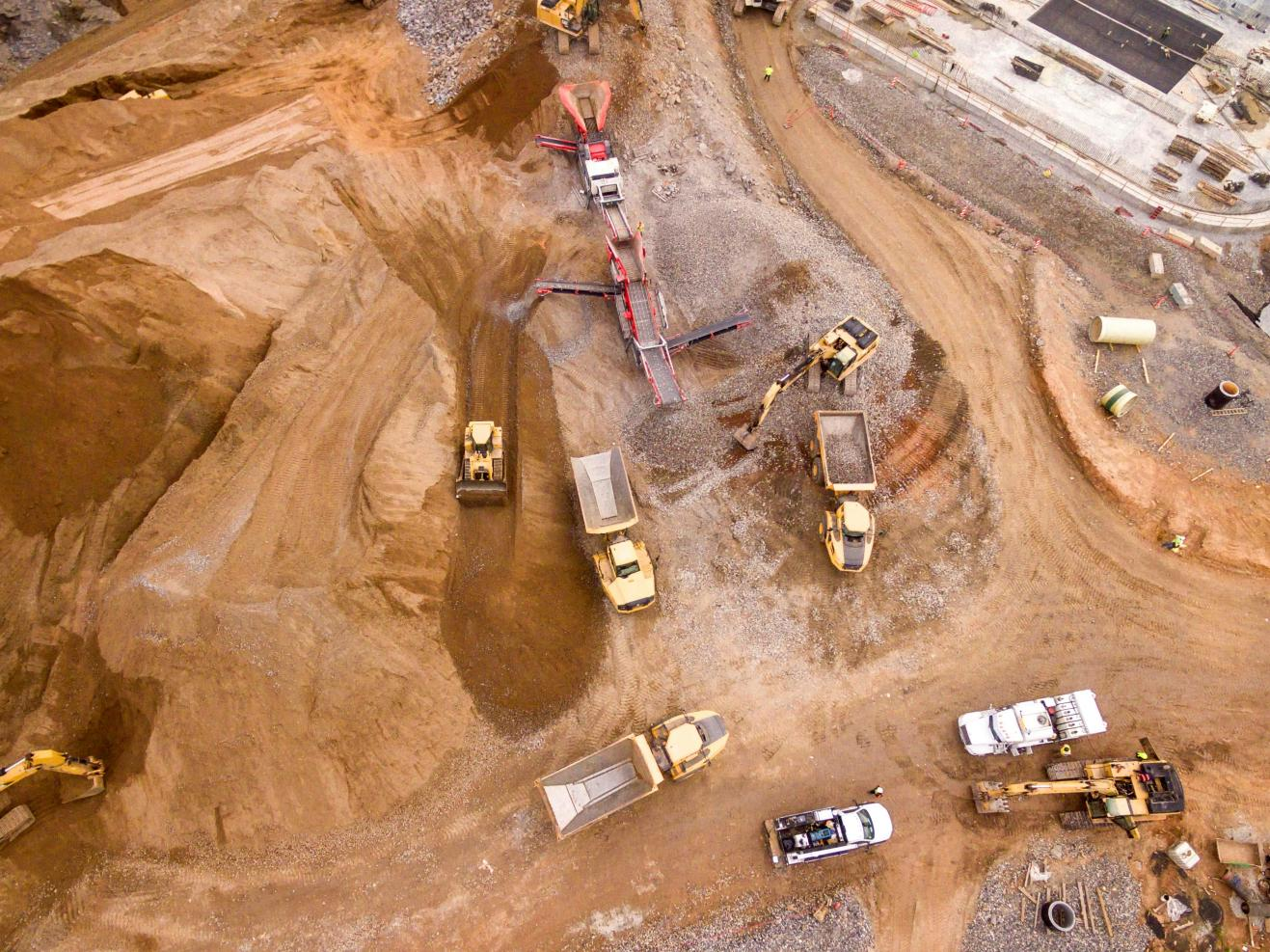
Aerial view of a Mining site. Photo Credit: Shane Mclendon on Unsplash.com
The founder and National president of Women in mining Nigeria (WIMIN) Janet Adeyemi explained that 23.1% of women in the mining industry experience sexual violence compared to 18.7% in non-mining communities.
While she vowed to fight against the prevalence of sexual and gender-based violence, she emphasized that sexual and gender-based violence affects individuals regardless of their age, gender, status, age and religion
A report by Premium times reveals that despite having found that Sexual harassment such as rape, request for sexual favors and unwanted physical touch are common at the mining sites, none has been reported to the Mining at the Ministry of Federal Ministry of Mines and Steel Development. And that the Mining Act of 2007, which regulates the exploration and exploitation of solid Minerals, has no provision on issues relating to all SGBV cases.
Work-wise, sexual exploitation is manifested in all spheres and in all professions, limiting survivors from getting to the peak of their careers as seen in the extractive sites in Plateau, north central Nigeria
Over the years, exploitation of women in informal work environment has been on the rise majorly because environments like mining sites are unregulated. This major factor has dwindled the active participation of women and girls in the extractive industry.
Apart from causing a high incidence of poverty, informal economies are also characterized by severe decent work deficits. Low quality employment, inadequate social protection, poor governance and low productivity.
A mining expert, Raulatu Piwuna, who lectures at the Geology and Mining Department, University of Jos explains that exploitation is in different aspects. Piwuna who is also the Plateau State Secretary of Women in Mining says the percentage of women in the informal mining sector is one of the things we wish we could determine.’’ I have empirical data to confirm these percentages, on face value interaction, visits to sites, I can confidently say we have about 40% to 45% of women in the informal mining sector in Plateau State, north central Nigeria’, she reveals
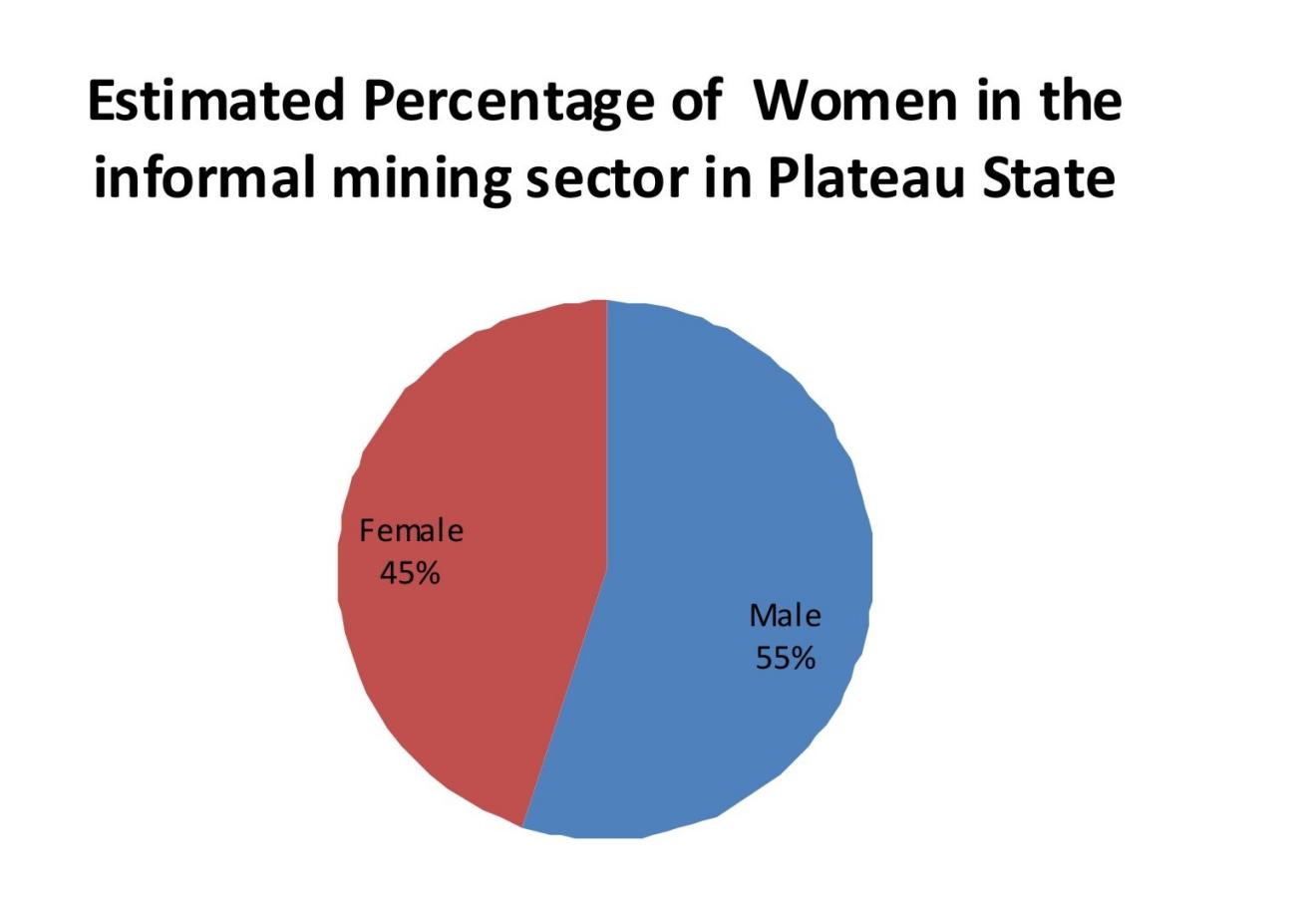
Piwuna mentioned that that the factors that keep women out of mining are the issues of funding; culture and tradition preventing them from digging the pits, and the access to markets. Lack of adequate funds prevents them from paying men to dig the pits for them.
She added that control of the tin sheds, mostly by the male gender, affects the women bringing in their produce to be processed. The women have not had the opportunity to be trained in the processing of these materials they get on-site, most of the tin sheds are male-dominated and the women are vulnerable to any interpretation or assessment of the materials they bring for dressing before the sales.
Women often complain that they will take a good material, but the tin shed owners who do the dressing will tell them that no, this is not good. It has too much iron, which lowers the grade. They exploit them and buy the material at low prices because of what they tell them they see as against the actual price, which may be of a higher value than what they had told them. “Tradition still frowns at women being the diggers,’ she says. ‘’They are permitted to stay at the points of collection, washing, and dressing, and do not allow them take full control of the holes where the material is being accessed’, she complained.
Confirming all sexual harassment stories told by the women at the extraction sites, she admonishes them to report to the association. “If you are afraid of your superiors, report to us. We will know how to carry it forward and fight it,’ she assures them.
One of such women who have been exploited over time by the men in the mining sector is Tessy Pwol, she explains that some men collect their money without giving them the materials. They will use the women’s money to mine and people who did not invest in purchasing the materials, will get everything while the women are shortchanged. ‘’Women are finding it very difficult in the mining business,” she says. “We don’t earn much compared to the work we do,’ says another female miner, Mary. She said the men gave them whatever they want and when they sold what was mined, they earned between N10,000 to N20,000 weekly’, while some women are forced to sleep with the men to get something extra to take home Mary laments
According to Mrs. Daniel, when she saw these misdemeanors happening in the fields, she vowed not to be a part of it. Back then, she said many men drove her away from their mining sites. She advised women in mining, not to believe that they could only succeed in the business by sleeping with men. She advised the women to learn the trade, ask questions and work hard.
HOW CAN FEMALE MINERS GET HELP?
On the way forward, Geologist and Mining expert, Raulatu Piwuna said the Women in Mining Association, has the Women in Mining (WIM) rights app, but sadly most of these women do not have Android phones. So, the association tells then to speak up when they are being harassed by the men. And then the association makes an official report using the WIM rights app. This app, she claims, is linked directly to the necessary quarters that will take note of the report and do a follow-up on it.
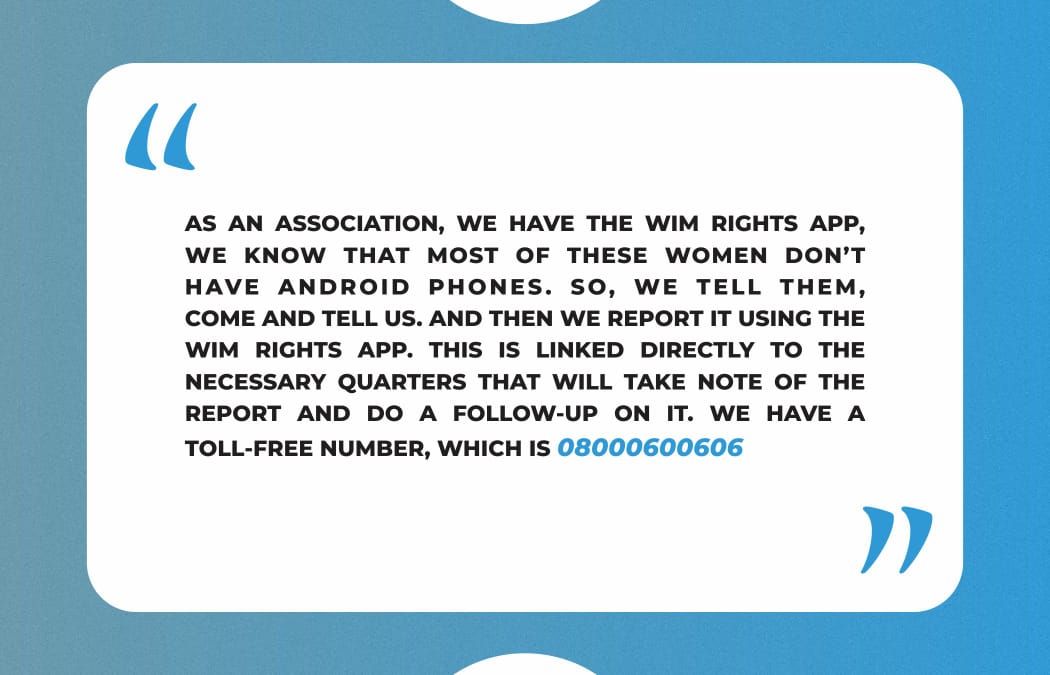
Piwuna said her association trains women on how to make sure that they do not allow themselves to be exploited or exposed to sexual harassment. She said the association encourages them to work in their numbers together, not move alone, and care for one another while on the sites
According to the State Commissioner for Women Affairs and Social Development, Caroline Panglang , there were reported cases of sexual harassment and molestation at some mining sites, and a case of “sex for job” racketeering. But unfortunately, the victims were reluctant to pursue their cases to a logical conclusion as expected, for fear of stigmatization, and for others, they could not afford the cost of justice.
She explained that generally, in the State, these are challenges of victims of Sexual and Gender-based Violence, SGBV. She revealed that she had to lobby for the upward review of the ministry’s budget to cater to the funding and cost of justice, to offer adequate security and social protection for victims.” My advice to victims of SGBV is to please speak out and get help.” says Panglang
Nene Dung, the Director of Media at Plateau State Gender and Equal Opportunities Commission, added that indeed that women are dehumanised at the extraction sites but because people do not come forward to report these incidents, it becomes difficult to defend them. She said there are adequate laws in Plateau State that protect women against violence.
She calls on women to report these things to the Gender and Equal Opportunities Commission. According to her, a gender court exists in the state but if the women do not report the cases, there is no way they can even know it happened and the perpetrators will not be made to face the full wrath of the law.
This story is part of the African Women in Media (AWiM) ‘Reporting Violence Against Women and Girls’ project, supported by the Wole Soyinka Centre for Investigative Journalism.
We’re not gonna spam. We’ll try at least.

Copyright 2020. African Women In Media
Copyright 2020. African Women In Media
Recent Comments